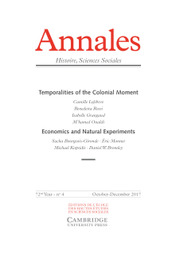No CrossRef data available.
Article contents
History and Geography in the Classroom Constructing Knowledge through Savoir-Faire
Published online by Cambridge University Press: 04 April 2017
Abstract
This article seeks to link the teaching of history and geography to issues affecting research in the two disciplines. It invites the reader to reflect on the relationship between the knowledge that a teacher passes on to his or her pupils and the acquisition of a research method as a savoir-faire or know-how, even as a way of being. After offering an insight into current teacher training, the author, a secondary-school teacher, uses concrete teaching situations to explain the necessity of making pupils active participants in their own learning process and helping them develop sound research methods.
- Type
- Historical Research and History Teaching in Secondary Schools
- Information
- Annales. Histoire, Sciences Sociales - English Edition , Volume 70 , Issue 1 , March 2015 , pp. 145 - 153
- Copyright
- Copyright © Les Éditions de l’EHESS 2015
References
1. “The best books ... are those that tell you what you know already.” Orwell, George, Nineteen Eighty-Four (London: Secker and Warburg, 1949), 201 Google Scholar.
2. Law no. 2013-395, dated July 8, 2013, laid out the orientation and schedule for a wide-ranging reform of the French school system. Chapter 7 stipulated the creation of graduate teacher-training institutes (Écoles supérieures du professorat et de l’éducation ) within universities.
3. Zweig, Stefan, “Geschichtsschreibung von morgen,” a conference presented in the USA at the beginning of 1939 and published in Zeit und Welt: Gesammelte Aufsätze und Vorträge, 1904–1940 (Stockholm: Bermann-Fischer, 1943)Google Scholar.
4. Daniel Pennac, School Blues, trans. chap. 12.
5. For another example of pedagogical practices that aim to build the confidence of students having difficulty with schoolwork, in this instance students for whom French is not their first language, see: “Multiplier des occasions d’écrire dans toutes les disciplines,” http://www.cndp.fr/crdp-creteil/vei-developper-pratiques-ecrits/vei-developper-pratiques-occasion-d-ecrire.
Linked content
This is a translation of: L’histoire-géographie en classe La construction d’un savoir par l’apprentissage d’un savoir-faire


